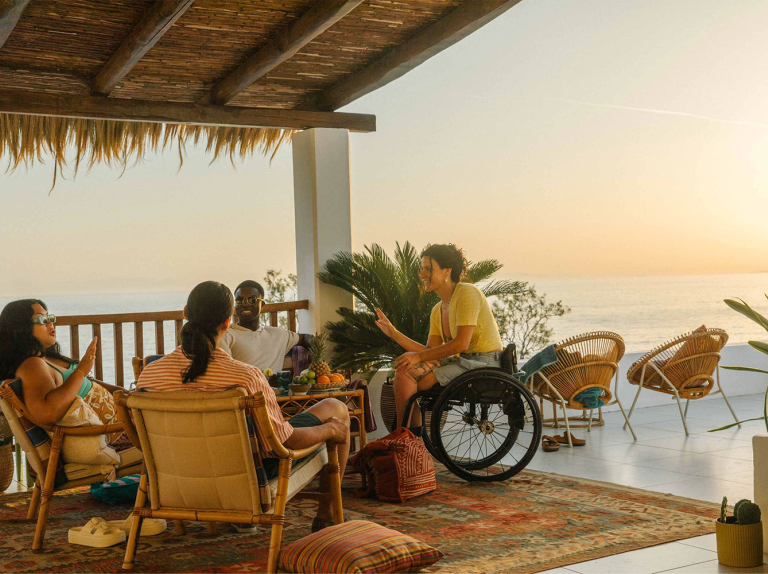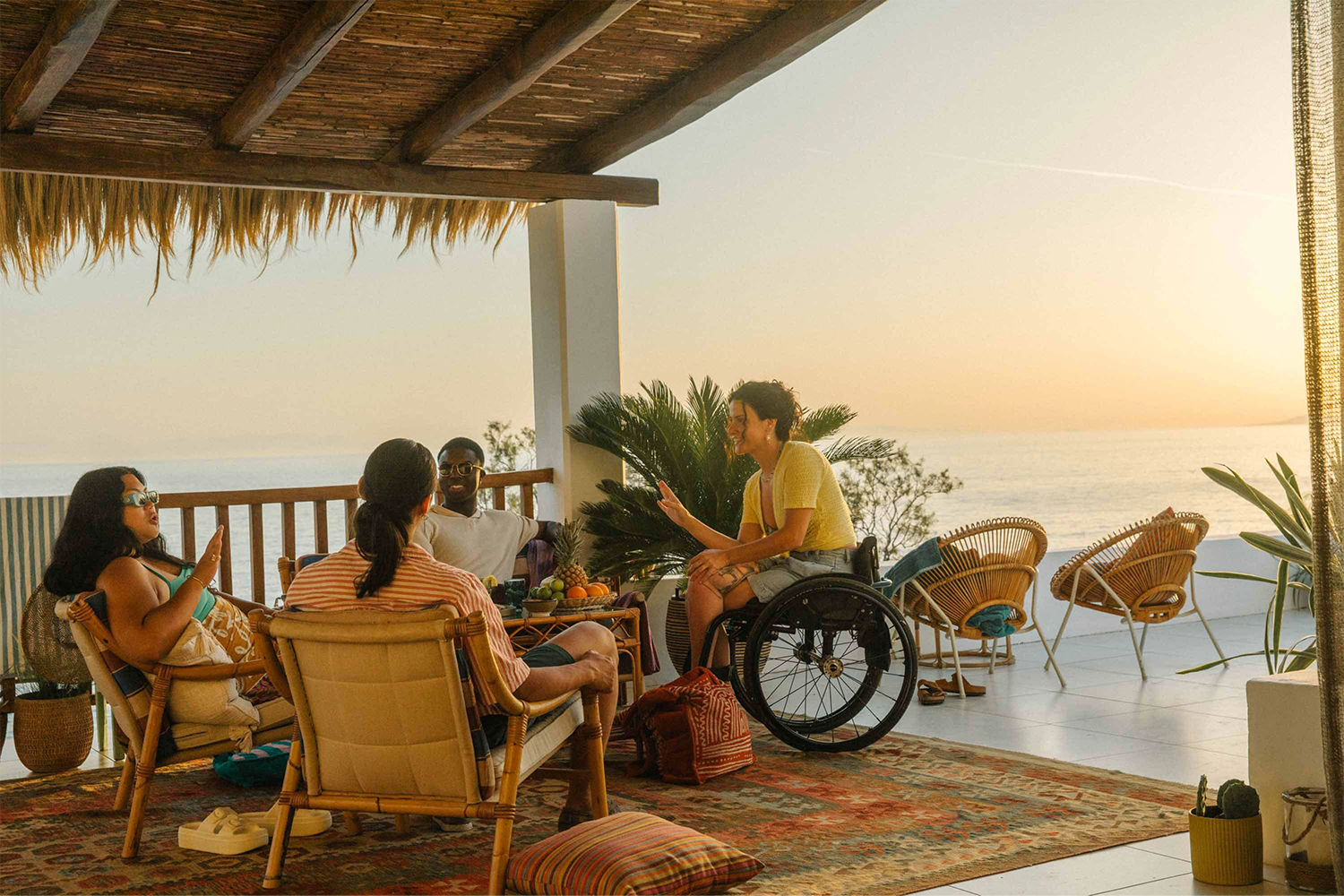
Identity-based barriers continue to impact travel access. A new study on the disparities among underserved travelers reveals that they are more likely than the general population to say their identity influences their destination and activity choices. Insights highlight the importance of representation in travel ads and opportunities for destination marketers.
Travel has the power to enrich lives and broaden perspectives. However, many people face barriers based on their identities that keep travel out of reach. In fact, 80% of underserved travelers report facing serious challenges throughout their experiences in travel.
Our new research, Journeys for All: An Expedia Group Study on Inclusion in Travel, looks into the disparities in travel experiences among underserved travelers in the United States, including Black, Latino, LGBTQIA+, and travelers with disabilities. Examining their journey, from planning and research to their experiences at their destination, there is an opportunity and imperative for the industry to change, to make travel more inclusive while building a stronger, more diverse visitor base for your destination.

Traveler Demographics Are Evolving
Underserved travelers make up a growing share of the travel market. According to projections from the US Census and the Human Rights Campaign, by 2040, the proportion of underserved communities and buying power is set to rise, boosting their economic impact on the travel industry. With traveler demographics changing, now is the time to update your strategies to reach this markedly growing audience of underserved travelers.
Making travel more inclusive will help you attract more visitors to your destination and build loyalty, resulting in happier travelers, more market share, destination affinity, and long-term success. As one destination marketing expert summed it up, “Part of it is just getting people to understand that diversity, equity, inclusion, accessibility is not yet one more thing to do — it's our responsibility. But more importantly, it's just good business.”
So where do you start?
Identity Impacts Choice
First, we need to understand that identity significantly impacts travel choices.
Underserved travelers are more likely than the general population to say that their identity influences their choice of destination, where they stay, and how they get there. Two in five (40%) underserved travelers feel limited by their identity when selecting destinations or activities, compared to 34% of the general population.
Promoting diversity and inclusion is essential in attracting these travelers. When they feel represented in promotions, they’re more likely to plan trips, as is the case for 78% of Latino and 71% of Black travelers, compared to 66% of the general population.
This preference also leads to repeat bookings. Seven in 10 (70%) LGBTQIA+ travelers are more likely to book again with brands that promote diversity, and more than half of Black (53%), Latino (57%), and travelers with disabilities (53%) are too — all more than the 48% of the general population that feels this way.
One of the study respondents, a Latino woman, explained, “I look for things that I can identify with, and now, with social media, you can see people that look like you or kind of fit the bill. That also helps to figure out what to stay away from or what to look out for."
A majority of underserved travelers — 82% of Black travelers, 81% of Latino travelers, 71% of travelers with disabilities, and 70% of LGBTQIA+ travelers — say that seeing themselves represented in travels ads matters, but most underserved travelers don’t currently feel represented. Latino (21%) and Black (18%) travelers, travelers with disabilities (12%), and LGBTQIA+ (11%) travelers all agree with this, and this lack of representation may be affecting your bottom line.
When underserved travelers feel represented in travel promotions, there is a higher likelihood that they will take a trip, including more than 70% of Black, Latino, and LGBTQIA+ travelers, and 59% of travelers with disabilities. This is even higher for travelers with intersectional identities, for example, Black travelers with disabilities (69%), Latino travelers with disabilities (80%), and LGBTQIA+ travelers with disabilities (76%).

Incorporating Inclusive Marketing Practices
Inclusion is critical for building a successful DMO campaign and should be intentionally and authentically incorporated from even the earliest stages of a traveler’s path to purchase. A good example of this is using inclusive social posts to engage early with travelers during the inspiration phase, when they are still undecided about a destination and are turning to social media for destination inspiration.
Compelling images are one of the most influential parts of travel ads, so make sure your marketing visuals are inclusive of diverse communities. This includes intersectionality and the overlap of identities and experiences as well as diversity includes races, genders, ages, families, couples, abilities, activities, and more. Be thoughtful in representing a variety of diverse perspectives in videos and imagery used in advertising and content marketing strategies for your destination.
Our advertising solutions, such as display advertising and bespoke Travel Spotlights or Co-op campaigns, provide different ways to effectively and authentically reach and engage with underserved travelers. These include customized, inclusive copy and diverse imagery to promote your destination’s unique and varied experiences.
Demonstrating A Commitment to Inclusion
Welcoming and accessible travel content goes a long way with underserved travelers, increasing their likelihood of traveling with you. The All Inclusive Boston campaign is a great example, demonstrating the destination’s commitment to inclusion by showcasing the city as a destination with a new generation of diverse entrepreneurs, innovators, artists, and more — a city that is truly welcoming to everyone, with the tagline: “We are a city of people. All people.”
Download Journeys for All: An Expedia Group Study on Inclusion in Travel for additional insights on underserved travelers and reach out to one of our experts today to learn more about different advertising strategies and solutions to help you create inclusive strategies and campaigns.
Submit Your Thought Leadership

Share your thought leadership with the Destinations International team! Learn how to submit a case study, blog or other piece of content to DI.


